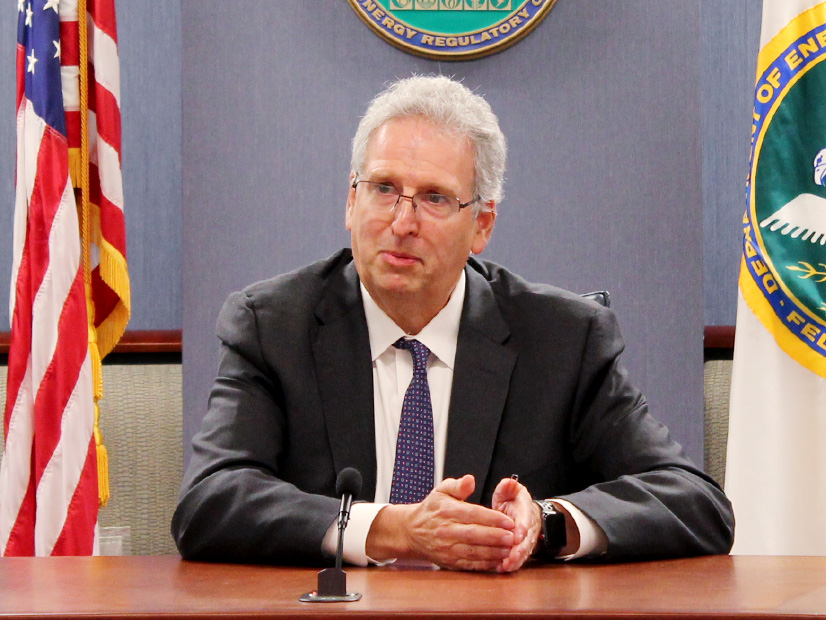
2022 was a busy year for FERC, with a series of rulemaking proposals and technical conferences that covered practically everything over which the commission has jurisdiction.
But it was Congress that passed the most consequential changes to U.S. energy policy last year, in the form of the Inflation Reduction Act. Most of FERC’s work was preliminary, meant to set up final rulemakings this year.
Because of that, the most significant event for the commission in 2022 may end up being the refusal of Sen. Joe Manchin (D-W.Va.), chair of the Senate Energy and Natural Resources Committee, to hold a confirmation hearing for Chair Richard Glick. That will leave the commission evenly split between Republicans and Democrats for at least part of 2023, casting a cloud of uncertainty over the work Glick did in his two years as chair. (See Glick’s FERC Tenure in Peril as Manchin Balks at Renomination Hearing.)
President Biden named Glick chair upon taking office in 2021 and nominated him for a second term in May, but Manchin said in November that he would not consider him. Glick’s tenure on the commission will end at noon Tuesday, when the current Congress adjourns. (See Glick Bids Farewell to FERC.)
As a result, Biden will need to choose between Democratic Commissioners Allison Clements and Willie Phillips to be the new chair. Having joined in December 2020 and December 2021, respectively, Clements and Phillips have spent less time the commission combined than Glick, who joined in November 2017.
The president will also have to nominate Glick’s replacement — a pick that will have to go through Manchin, who will remain a wild card this year even after Democrats gained a Senate seat during the midterm elections.
And Biden will need to decide whether to nominate Commissioner James Danly for a second term or choose another Republican to succeed him. Danly’s term expires June 30. Senate Republicans — as well as Manchin, perhaps — will likely insist that the nominees for Glick’s and Danly’s seats be paired. That could leave the commission split for more than half of the year.
At his final post-open meeting press conference Dec. 15, Glick suggested this would likely be the case, but he expressed optimism that the commission would not deadlock frequently.
“I would also say there’s an opportunity here [when] Commissioner Danly’s position becomes open,” Glick said. “The Senate can confirm my replacement and Commissioner Danly’s replacement at the same time. … I very much hope that the president nominates our replacements and moves forward as quickly as possible.”
Pending Proposals
Manchin was angered by the commission’s plans to consider greenhouse gas emissions in natural gas infrastructure certificates.
The two proposals — to update its 1999 policy statement on natural gas infrastructure certificates (PL18-1) and guidance on how it will evaluate the impacts of projects’ greenhouse gas emissions in its environmental analyses (PL21-3) — were originally not proposals at all. Over the objections of the Republican minority, they were issued as final documents in February, but the commission rescinded and rereleased them as drafts the next month. The Democrats said they were persuaded by stakeholders who expressed confusion and their criticism that the policies would apply retroactively to projects already pending before the commission. (See FERC Backtracks on Gas Policy Updates.)
Those are just two of the proposals that the commission will continue to consider this year. Also pending are proposals to overhaul generator interconnection queue processes (RM22-14) and transmission cost allocation and planning rules (RM21-17).
Each set of rule changes have elements that are supported by certain stakeholder sectors and those that are opposed by others. (See RTOs, Utilities Push Back on Interconnection Deadlines, Penalties and Battle Lines Drawn on FERC Tx Planning NOPR.)
Given the controversy surrounding each, and the split commission, FERC may approve those elements it can achieve consensus on rather than attempt to pass the proposals wholesale. For example, there seems to be wide support among both commissioners and stakeholders for a provision in the interconnection proposal to replace the serial “first-come, first-served” study procedure with “first-ready, first-served” cluster studies.
Both proposals are being watched closely not just by RTO/ISO stakeholders, but by environmentalists and climate hawks as well. Most of the resources in utilities and grid operators’ clogged queues are renewables, and there is increasing acknowledgement among state policymakers and environmentalists that large-scale transmission buildout is needed to accommodate those resources.
Even Danly — who always keeps FERC Secretary Kimberly Bose busy listing his many concurring and dissenting opinions at open meetings — said it was obvious that the queue processes needed fixing by FERC, rather than RTOs and utilities. He said he supported “a number of meritorious” provisions in the interconnection proposal. Danly’s support was also notable because of his frequent criticism of both federal and state policies that favor renewables over natural gas, which he argues is explicitly stated in U.S. law to be a necessary public good.
It was for that reason he opposed the transmission planning proposal, arguing that “it is designed to encourage buildout of transmission specifically for the purpose of encouraging the development of certain types of resources.”
Commissioner Mark Christie (R) may end up being the swing vote in many dockets, and key to what provisions make it into any final rules passed out of the interconnection and transmission proposals. Highly independent, Christie last year joined Danly in dissenting on high-profile cases perhaps as many times as he joined Democrats in support — though sometimes tepidly in the latter. The former chair of the Virginia State Corporation Commission, Christie often speaks up for states’ right to choose their resource mix and supports policies that protect that right.



